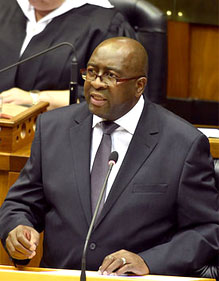|
Getting your Trinity Audio player ready...
|
 Public protector Thuli Madonsela will get the financial support she needs to expand her staff capacity, while a new central government tender database will come into existence in a few weeks to curb reckless public procurement. These are just two of the key governance-related announcements made by Finance Minister Nhlanhla Nene in his maiden budget in Parliament on Wednesday.
Public protector Thuli Madonsela will get the financial support she needs to expand her staff capacity, while a new central government tender database will come into existence in a few weeks to curb reckless public procurement. These are just two of the key governance-related announcements made by Finance Minister Nhlanhla Nene in his maiden budget in Parliament on Wednesday.
Read the full speech online or download it as a PDF.
Boost for Madonsela
Madonsela’s office thanked the minister, saying it is indeed a kind gesture for which they are truly thankful. Spokesperson Oupa Segalwe told Corruption Watch that as far as they understand it, the allocation to the office is R60-million in the medium term for investigation capacity and the retention of trainee investigators.
“Even though the funding is a bit of a drop in the ocean, it will certainly bring a significant relief,” said Segalwe. “In his letter to the public protector last week, it was clear that the minister realises that the additional funding is not enough and he encourages us to continue following formal budget processes to raise awareness about our challenges.”
Madonsela’s office has just over 300 staff members, a case for concern since the chapter nine institution’s case load has more than doubled since she took office in 2009. In an interview with Corruption Watch last year, Madonsela said when she came into office, her predecessor Lawrence Mushwana had complained to Parliament about not having enough staff and had submitted an organisational structure that was approved by Parliament of the time, comprising a staff of about 540.
“When we last met Parliament in August [2014], there was a sympathetic voice around the resources, from all parties,” she said. “…if we’re implementing the National Development Plan (NDP) then we should be given more money and more skills, that’s what the NDP says.”
“We sincerely thank the minister and government at large for hearing our prayers and for recognising the place and value of the public protector in our constitutional democracy,” Segalwe told Corruption Watch.
Centralised database to curb procurement corruption
Referring to the recently published review of government’s supply chain management, Nene said he was confident of its interventions to establish a good public procurement ethos that ensures that state finances are spent wisely and efficiently.
“From April 2015, a central supplier database will be introduced,” he said. “Suppliers will only be required to register once when they do business with the state.” This, he added, will significantly reduce the administrative burden for business, especially small and medium-sized enterprises.
“The database will interface with Sars, the Companies and Intellectual Property Commission and the payroll system. It will electronically verify a supplier's tax and BEE status, and enable public sector officials doing business with the state to be identified.”
The Public Administration Management Act, which President Jacob Zuma signed into law in December, makes it illegal for public servants to do business with government.
“This intervention will also reduce the administrative burden for supply chain management practitioners and address many of the concerns raised by the auditor-general every year,” said Nene.
Auditor-general Kimi Makwethu pointed out in his last audit outcomes of state departments, in November last year, that although legislation exists to ensure efficient procurement management, this is the area in which departments show a weakness. “A big part of the compliance [required of departments] has a lot to do with procurement-related activities, and if there is no clear transparent process that is governed by regulations when it comes to supply chain, we never know whether they have spent much more than they should have spent, or if they did indeed receive all the goods they ought to have received,” he explained at the time.
Of the central database, Nene said it will become compulsory for every single tender to be advertised on this platform, with all relevant documents being freely available there. At this point the finance minister switched to isiZulu to say that corruption by public officials – who already take home generous salaries – is unfair on the citizens who deserve good service delivery.
The national Department of Basic Education will be the first to implement Treasury's central procurement management system.
Some of the interventions in this regard include :
- All books delivered to schools from January 2016 will be managed through a centrally negotiated contract;
- With effect from May this year, all school building plans will be standardised and the cost of construction will be controlled by the Office of the Chief Procurement Officer;
- Routine maintenance of school buildings and minor construction works will be decentralised. This will be accompanied by measures to combat inefficiency and corruption at district and school level.







